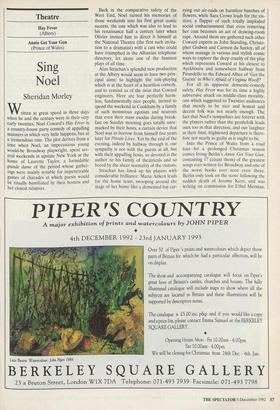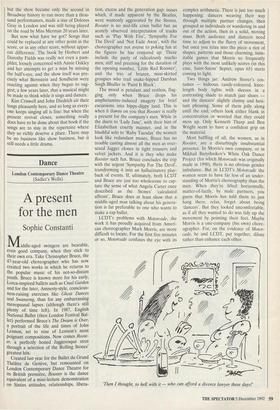Theatre
Hay Fever (Albery) Annie Get Your Gun (Prince of Wales)
Sing Noel
Sheridan Morley
Written at great speed in three days when he and the century were in their very early twenties, Noel Coward's Hay Fever is a country-house party comedy of appalling manners in which very little happens, but at a tremendous rate. The plot derives from a time when Noel, an impecunious young would-be Broadway playwright, spent sev- eral weekends in upstate New York at the home of Laurette Taylor, a formidable grande dame of the period whose gather- ings were mainly notable for impenetrable games of charades at which guests would be ritually humiliated by their hostess and her closest relatives.
Back in the comparative safety of the West End, Noel turned his memories of those weekends into his first great comic success, the one which was also to lead to his renaissance half a century later when Olivier invited him to direct it himself at the National Theatre (the first such invita- tion to a dramatist) with a cast who could have triumphed in the Albanian telephone directory, let alone one of the funniest plays of all time.
Alan Strachan's splendid new production at the Albery would seem to have two prin- cipal aims: to highlight the role-playing which is at the heart of a heartless comedy, and to remind us of the twist that Coward engineers. Here are four perfectly harm- less, fundamentally nice people, invited to spend the weekend in Cookham by a family of such monstrous egotism and neurosis that even their mass exodus during break- fast on Sunday morning goes totally unre- marked by their hosts, a curtain device that Noel was to borrow from himself five years later for Private Lives. Yet by the end of the evening, indeed by halfway through it, our sympathy is not with the guests at all, but with their appalling hosts, so devoted is the author to his family of theatricals and so bored by the sheer normality of the visitors.
Strachan has lined up his players with considerable brilliance: Maria Aitken leads for the home team, swooping around the stage of her home like a demented bat car-
rying out air-raids on harmless bunches of flowers, while Sara Crowe leads for the vis- itors, a flapper of such totally imploded social embarrassment that even removing her coat becomes an act of drawing-room rape. Around them are gathered such other Coward experts as John Standing, Christo- pher Godwin and Carmen du Sautoy, all of whom manage in various and stylish comic ways to explore the deep cruelty of the play which represents Coward at his closest to Ayckbourn and somewhere halfway from Pirandello to the Edward Albee of 'Get the Guests' in Who's Afraid of Virginia Woolf? For all its apparent domestic-comedy safety, Hay Fever was for its time a highly subversive attack on middle-class morality, one which suggested to Twenties audiences that merely to be nice and honest and decent folk was not nearly enough. The fact that Noel's sympathies are forever with the players rather than the gentlefolk leads ours too in that direction, and our laughter at their final, frightened departure is there- fore not nearly as guilty as it ought to be.
Into the Prince of Wales from a road tour for a prolonged Christmas season comes Irving Berlin's Annie Get Your Gun, containing 17 (count them) of the greatest songs ever written for Broadway and one of the worst books ever 'seen even there. Berlin only took on the score following the sudden death of Jerome Kern, and was writing on commission for Ethel Merman, but the show became only the second in Broadway history to run more than a thou- sand performances, made a star of Dolores Gray in London and was still being played on the road by Miss Merman 20 years later.
But now what have we got? Songs that could be replaced at any other point in the score, or in any other score, without appar- ent difference. The book by Herbert and Dorothy Fields was really not even a pam- phlet, loosely concerned with Annie Oakley and her attempts to get a man by missing the bull's-eye, and the show itself was pre- cisely what Bernstein and Sondheim were reacting against when they began to sug- gest, a few years later, that a musical might be made to think while it sings and dances.
Kim Criswell and John Diedrich air their lungs pleasantly here, and so long as every- one keeps singing all is fine: but when the present revival closes, something really does have to be done about that book if the songs are to stay in the repertoire where they so richly deserve a place. There may be no business like show business, but it still needs a little drama.











































































 Previous page
Previous page